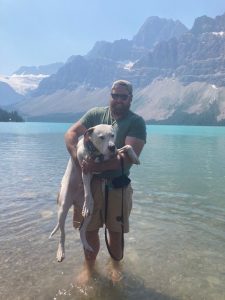 Name: Ryan Falk
Name: Ryan Falk
Program: Doctor of Philosophy in Rehabilitation Sciences (PhD)
Dissertation: Chasing Time: The Specific Impacts and Dynamic Relationships of Physical Activity, Sedentary Behaviour, and Sleep on Older Adults’ Cognitive Health
Graduated: Spring 2020
How would you describe your research project in the UBC Rehabilitation Sciences program?
My PhD thesis examined how physical activity, sedentary behaviour (i.e., time spent sitting or lying down), and sleep share a complex and interactive relationship with older adult cognitive health. We’ve known for over 20 years now that physical activity and exercise training can promote cognitive and brain health, and there is a growing appreciation that too much sitting and/or poor sleep quality may also be related to an increased risk of cognitive decline and dementia. However, these behaviours do not happen in isolation. For instance, becoming more physically active can improve sleep quality, and may thus improve our cognitive function. My PhD thus examined how physical activity, sedentary behaviour, and sleep interact with each other and older adult cognitive health. The findings of my thesis contribute to a better understanding of how each of these behaviours impact older adult cognitive health, and has helped to refine the public health message for best promoting healthy cognitive ageing through lifestyle.
Where and what is your current position?
Since graduating in the spring of 2020, I have been a postdoctoral fellow in the Department of Physical Therapy working under the supervision of Professor Teresa Liu-Ambrose. My postdoctoral fellowship work has used data from the Canadian Longitudinal Study on Aging to examine how physical activity and sleep are associated with cognitive function, and whether these associations are age and sex dependent. I was also recently awarded a Michael Smith Foundation for Health Research (MSFHR) trainee award to work with UBC Associate Professor Roger Tam (School of Biomedical Engineering), which will begin in September 2021. This project aims to use machine learning (i.e., artificial intelligence) to develop an algorithm to predict dementia risk from the 24-hour rest-activity cycle using actigraphy (similar to a FitBit).
How do you like to spend your free time?
During the pandemic, my wife and I decided that it was a perfect time to get a puppy, and so most of my free time this past year has been spent training and playing with our dog Budweiser (aka, Buddy). Aside from uploading photos of our dog to his Instagram account (yes he does have one, and its @budweiserbarks for those interested), I also love camping, hiking, fishing, and exploring all of BC. I also love going for runs with the dog, lifting weights, and going to all of BC’s many craft breweries.